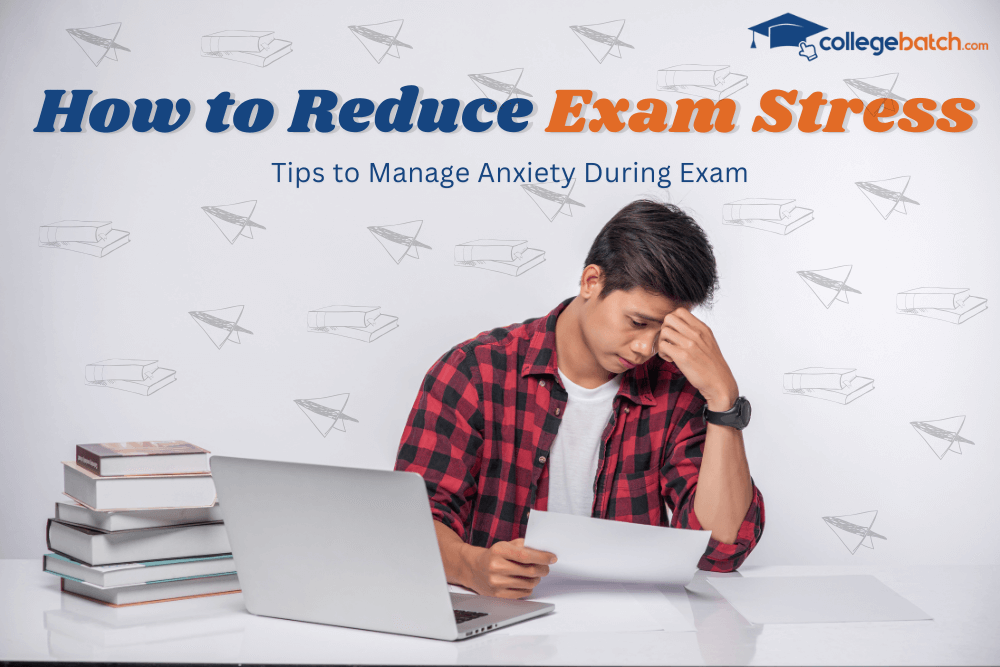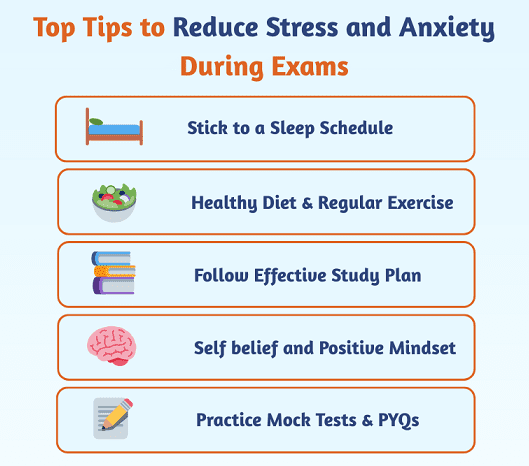How to Reduce Exam Stress? Tips to Manage Anxiety During Exam
by ago 2,116 views0

Exam stress is an anxious feeling and sometimes it can be hard to deal with, but building a healthy lifestyle can help cope up with the same. Students who get stuck with the question ‘how to reduce exam stress’ need to know that it is completely normal and the majority of the individuals go through this. Some major reasons for the same can be lack of sleep, unhealthy lifestyle, and sometimes having high expectations, which can lead to the fear of failure.
This blog includes everything about how to reduce exam stress, why students go through this, and tips to reduce stress before exam.
Contents
How to Reduce Stress and Anxiety During Exams (Top Tips)
A lot of students deal with stress every time before appearing for an exam whereas, some feel it occasionally. The level of exam stress depends & varies between students on the basis of different factors. There are cases when students have exam anxiety but they don’t know how to deal with it.

Mental, physical, and emotional health should be prioritized equally and need to be in sync while preparing for exams. Here are some effective tips for how to reduce stress and anxiety during exams:
1. Sleep Schedule
Having a great 7 to 9 hours of sleep can help a lot with exam stress management as it is a natural stress reliever and helps the mind to calm down. Quality sleep is important for mental and emotional health and that is why a proper sleep schedule should be maintained, especially before exams.
Not sleeping enough can cause disruptions in mind and body which can increase stress level, so it is better to have adequate sleep.
Also Read: Top Toughest Exams in India
2. Healthy Diet & Regular Exercise
It is important to keep the body healthy and physically fit in order to keep the mind focused. Food containing nutrition and protein should be given priority, as an unhealthy diet directly affects physical health which can severely impact emotional and mental well-being.
Along with a healthy diet, some effective ways to get an answer for how to reduce tension before exam include yoga, meditation, gym or any other activity. It is because a physically active body produces endorphins which improves mood and reduces anxiety, fear, and pain.
3. Effective Study Plan
During the exams, the most important part is maintaining a proper study plan which includes time for preparation as well as dedicated time for revision. Along with a good study schedule, exam stress management also needs to be taken into consideration.
When the syllabus is completed and is thoroughly revised, it creates a sense of belief which reduces tension before the exam. During breaks, either practice any mind relaxing exercise or dedicate it to any hobby as doing something fun or of interest can help with exam stress relief.
4. Self belief and Positive Mindset
Self belief is crucial in every aspect of life because self doubt will never let a person grow. Knowing everything will pass and self belief can be a great motivation. Instead of thinking only about how to reduce exam stress and increasing anxiety, it is way better to find an answer for it and get to work.
Think positive and when things get tough, share it with someone like a friend, counselor, teacher, or anyone else, instead of drowning in it alone. Also, to avoid anxiety, be more in the present to remain attentive while studying for exams.
5. Solve Old Question Papers / Appear for Mock Tests
Solving old question papers and taking mock tests is the best way to know how much syllabus is covered and which topics require more attention. These will help the students identify their strengths and weaknesses, enhance confidence, and assist with time management.
Moreover, if students solve old papers / take the mock tests as the final exam, it becomes effective to test their knowledge and the result will give a realistic review of the overall preparation. This will ultimately help them track their preparation level & progress.
Also Read: List of Top Entrance Exams
Conclusion
Dealing with exam stress sometimes can be challenging but by following the tips to reduce stress before an exam, anybody can cope up with it.. Note that a healthy lifestyle is crucial for the students struggling with the question ‘how to reduce exam stress?’. It is because students living a healthy life are more focused than those who do not.
Eat healthy, sleep well, and prepare effectively for exams; never let self-doubt or anxiety be the hurdle in the way of getting good results.
FAQs on Exam Stress Management
1. Is anxiety before any exam considered normal?
Yes, it is considered a natural phenomenon as a lot of students go through this. Major reasons for the same include unhealthy lifestyle and self doubt.
2. How to reduce exam stress and anxiety?
Students can reduce anxiety and stress before the exam by preparing well, practicing mind relaxing exercises like meditation, and living a healthy life.
3. How to deal with exam fear?
Preparing well for exams can help overcome the fear; for this, students can go through the syllabus thoroughly and try solving old question papers.
4. What is severe exam phobia?
Symptoms of severe exam phobia include palpitation, anxiety, and sweating more than usual. In some cases, exam phobia becomes the reason for the students falling sick.
